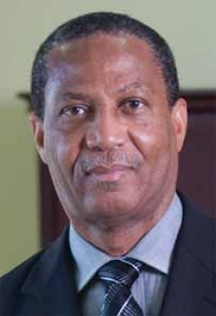(Trinidad Express) – Caribbean governments should look at adjusting the limits pension funds can invest overseas for better risk management.

This is the view of Professor Compton Bourne, Executive Director, Caribbean Centre for Money and Finance (CCMF) and CCMF Research Fellow Dr Anthony Birchwood.
Last Friday the CCMF hosted the Caribbean Business Executive Seminar themed “The Future of the Pension Industry in the Carib-bean” at the Hyatt Regency (Trinidad), Port of Spain.
Bourne, speaking with the Business Express last Thursday at the CCMF, the University of the West Indies, St Augustine, said for pension schemes generally in the Caribbean, there was a maximum limit to be invested overseas.
“While it satisfies the requirement to use locally generated funds to develop the domestic financial system it also raises a problem of increasing investment risk when the portfolio grows,” he said.
He said one of the cardinal principles in finance was that you diversify your investment and “do not put all your eggs in one basket”.
He pointed out that the larger the sum of money, the less the ability of the domestic economy to absorb those funds with the same degree of “risk freeness”.
Bourne pointed out that in Latin American countries, where the limit for pension funds to invest overseas was 20 per cent, many have moved to 30 per cent to allow for a “little more latitude” and managing of risk.
Bourne said to his knowledge the limit was about 20 per cent locally.
Birchwood said while you wanted to safeguard local investors the domestic economy did not have sufficient instruments, and this was a “big dilemma” faced by small economies.
He noted that currently interest rates internationally were low but in the future they could be higher and therefore more attractive to put funds abroad.
Bourne said typically interest abroad are a few points lower than locally and “typically the draw is safety”.
He noted that Central Banks invest in US treasuries even when the interest rate is 0.05 per cent.
“Safety is a prime factor in investment decisions,” he added.
Bourne said while domestic financial firms may argue that they have the capacity to absorb investment from pension funds they are betting on their own risk management opportunities and “might be too optimistic”.
He noted there was the issue of where the pension funds were being invested and the quality of the investment decision.
“Whether you are putting resources into relatively safe investments,” he added.
He noted you could potentially “lose everything” such as the case with the collapse of the CL Financial Group, which had many pension funds in various instruments by the conglomerate. Bourne pointed out that even with “wise investments” with capital safety pension funds could still be affected by changes in the financial market.
He said before the global financial crisis US government securities were three per cent but it was currently below one per cent, and earning on investment that are safe are minimal.
He noted that social security schemes such as the local National Insurance Scheme (NIS) was the baseline pension for many people and how it is structured and managed is “very critical”. He said there was an issue as to the extent to which social security themes would invest so heavily in government adding that many regional schemes hold a significant proportion of their portfolio in government bonds and treasury bills.
“And we have seen in the region that many of them are also beginning to make loans to other quasi-government bodies and sometimes marginally government bodies,” he said.
He noted in Barbados recently there was the issue of NIS investing in a large hotel project. “It raised quite a few eyebrows,” he recalled.
Bourne noted that companies had to find investments with a sufficient flow to pay pensioners at the agreed level. He said this was an issue of governance and stressed that pension schemes should have representatives who are beneficiaries and potential beneficiaries.
On the public service pension scheme, where you work, retire and then get your pension, Bourne said individual governments had to be able to sustain taxes at requisite levels and balance with other obligations. He said this was usually not a problem but with an aging population, as this country has, there are greater demands on pension payments. He also pointed out that the greater the unemployment the smaller the income tax space.
On the regulatory system for financial institutions in the region Bourne said while “not that weak” they were “far from perfect”. He noted in Jamaica about 15 years ago there were “pension clubs” that appealed to the public to invest and in almost every instance “resources were lost”.
He said these schemes were outside the ambit of the regulatory authorities, in any system there would be loopholes, and the regulators were in a “catching up game”.





